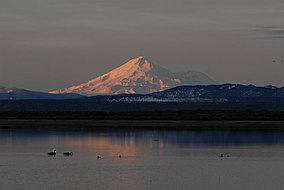Tule Lake National Wildlife Refuge
| Tule Lake National Wildlife Refuge | |
|---|---|
IUCN category IV (habitat/species management area) | |
 | |
| Location | Modoc County and Siskiyou County, California, United States |
| Nearest city | Klamath Falls, Oregon |
| Coordinates | 41°56′48″N 121°33′54″W / 41.94667°N 121.56500°W |
| Area | 39,116 acres (158.30 km2) |
| Established | 1928 |
| Governing body | United States Fish and Wildlife Service |
| Website | Tule Lake NWR |
The Tule Lake National Wildlife Refuge is a National Wildlife Refuge of the United States in northern California near the Oregon border. It covers 39,116 acres (15,830 ha) in the Tule Lake basin. It is part of the Klamath Basin National Wildlife Refuge Complex, and is a crucial part of the Pacific Flyway corridor for migratory birds.[1][2]
The refuge was established in 1928 by President Calvin Coolidge to preserve habitat for birds and other animals. It is a staging area for migrating waterfowl such as the greater white-fronted goose, snow goose, Ross's goose, and cackling goose.[3] The refuge's waterways are inhabited by endangered fish species such as the Lost River sucker and shortnose sucker.[3][4]
Local habitat types include uplands vegetated with grasses and shrubs such as sagebrush, and wetlands such as marshes.[5] The refuge also includes about 19,000 acres of cropland leased to growers. Crops include potato, onion, horseradish, alfalfa, and cereals.[3]
Recreation opportunities and public services include wildlife viewing and photography, education, and hunting.[6]
Gallery
[edit]-
Sunrise on Discovery Marsh
-
Tule Lake lower marsh
-
Visitors' Center
-
Sage thrasher on the refuge
See also
[edit]References
[edit]- ^ "Klamath water arrives, saving 50,000 ducklings from certain death". SF Chronicle. July 24, 2020. Retrieved July 25, 2020.
- ^ Schwartz, Alex (November 22, 2021). "How Tule Lake Refuge avoided another disaster". Indian Country Today. (Klamath Falls) Herald and News. Retrieved April 17, 2022.
- ^ a b c About the Tule Lake National Wildlife Refuge. USFWS.
- ^ Alexander, Kurtis (April 15, 2022). "A vast California lake is set to run dry. Scientists are scrambling to save its endangered fish". San Francisco Chronicle. Retrieved April 17, 2022.
- ^ Tule Lake National Wildlife Refuge: Habitat. USFWS.
- ^ Tule Lake National Wildlife Refuge: Visitor Activities. USFWS.
External links
[edit] Media related to Tule Lake National Wildlife Refuge at Wikimedia Commons
Media related to Tule Lake National Wildlife Refuge at Wikimedia Commons- Tule Lake National Wildlife Refuge. USFWS.
- IUCN Category IV
- National Wildlife Refuges in California
- Protected areas of Modoc County, California
- Protected areas of Siskiyou County, California
- Modoc Plateau
- Wetlands of California
- Landforms of Siskiyou County, California
- Modoc County, California, geography stubs
- Shasta Cascade geography stubs
- California protected area stubs





